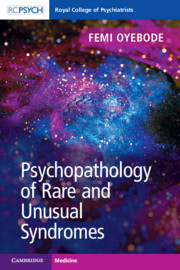Book contents
- Psychopathology of Rare and Unusual Syndromes
- Psychopathology of Rare and Unusual Syndromes
- Copyright page
- Contents
- Reviews
- Preface
- Section 1 Abnormalities of Belief and Judgement
- Section 2 Abnormalities of the Experience of Love
- Section 3 Abnormalities of Perception
- Section 4 Abnormalities of the Self
- Chapter 12 Depersonalization
- Chapter 13 Autoscopy and Related Syndromes
- Chapter 14 Dissociation
- Section 5 Abnormalities of Experience of the Body
- Section 6 Abnormalities of Memory Function
- Section 7 Abnormalities of Behaviour
- References
- Index
Chapter 12 - Depersonalization
from Section 4 - Abnormalities of the Self
Published online by Cambridge University Press: 26 August 2021
- Psychopathology of Rare and Unusual Syndromes
- Psychopathology of Rare and Unusual Syndromes
- Copyright page
- Contents
- Reviews
- Preface
- Section 1 Abnormalities of Belief and Judgement
- Section 2 Abnormalities of the Experience of Love
- Section 3 Abnormalities of Perception
- Section 4 Abnormalities of the Self
- Chapter 12 Depersonalization
- Chapter 13 Autoscopy and Related Syndromes
- Chapter 14 Dissociation
- Section 5 Abnormalities of Experience of the Body
- Section 6 Abnormalities of Memory Function
- Section 7 Abnormalities of Behaviour
- References
- Index
Summary
The nature of the self is essential to an understanding of the conditions described in this section. For Jaspers (1997), the self has four formal characteristics, namely (1) the feeling of activity, that is, an awareness of being active; (2) awareness of unity; (3) awareness of identity; and (4) awareness of being distinct from an outer world and all that is not self. The awareness of activity depends upon kinaesthetic information from our joints and muscles and proprioceptive information regarding the position of bodies in space. In addition to these two sensory modalities, the other senses, including vision, hearing and touch, also contribute to our knowledge of being active. Thus, sensory data play a significant role in the definition of the body schema, in the manner in which our body exists in space and how it is engaged in particular activities. It is plain from the preceding that the awareness of activity is derived from our being embodied such that it is difficult to imagine a sense of activity of the self without corporeality. I discuss embodiment and the abnormalities of the body in the next section.
- Type
- Chapter
- Information
- Psychopathology of Rare and Unusual Syndromes , pp. 131 - 140Publisher: Cambridge University PressPrint publication year: 2021



